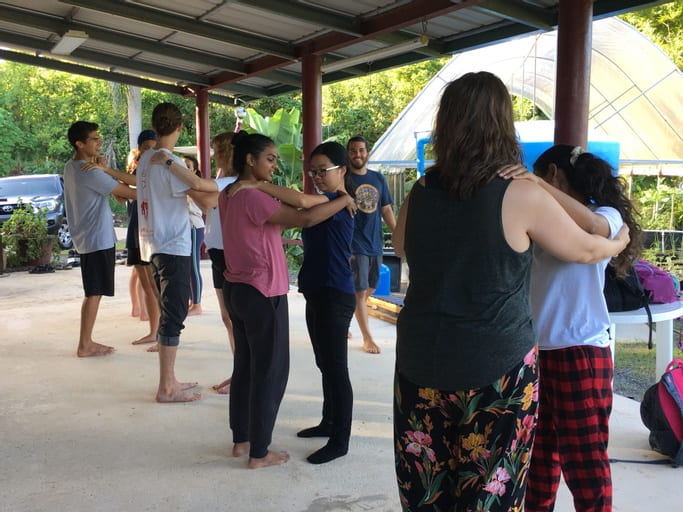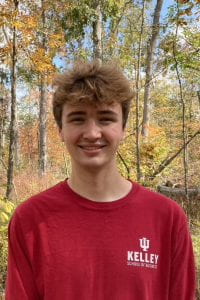
Apurva Gadde, president of Kelley’s Alternative Break Program, worked with indigenous women in Oaxaca, Mexico.
BLOOMINGTON, Ind. – Three years ago, Indiana University Kelley School of Business student Gracelyn “Grace” Pavy traveled to Puerto Rico for spring break. But instead of looking for sun, sand, and libations, she spent the week working with a non-profit organization focused on sustainable farming.
“This included eating the food previous groups planted, planting food for future groups, composting, and teaching young students about sustainable practices,” recalled Pavy, a senior from LaPorte, Indiana and a Kelley Scholar. “I learned a lot about setting personal goals to minimize my individual carbon footprint as well as how to apply circular economic thinking into my future career.”
Fifty-one Kelley students are traveling to five destinations across the United States to participate in alternative spring break trips, restarting a decades-long tradition at the school that was interrupted by the COVID-19 pandemic.

Gracelyn “Grace” Pavy
Some students are traveling to Detroit to participate in a program that fosters urban revitalization through entrepreneurship. Others will travel to South Dakota to work with Native Americans on a project that helps preserve their culture. Another group will learn about prison reform in Washington, D.C. through the organization Thrive DC. Other trips will take students to South Carolina, where they will assist with water sustainability and social entrepreneurship projects.
“Students get the chance to learn more about social issues from one of our partner organizations, and engage with the local communities in an attempt to try to make a difference,” explained Apurva Gadde, a senior from Hyderabad, India and president of the student organization Alternative Break Program. “They typically spend most of their time volunteering with the organization and reflecting on their experiences as a group at the end of the day.
“Students are motivated to go on our trips if they’re willing to branch out and learn more about a social issue, and if they want to experience something college career-defining,” Gadde added. “While these trips focus on social issues, volunteering, and learning, they are also a great way to find a community of people who care about similar issues, which is enticing to many.”
When she was a freshman, Gadde visited Oaxaca, Mexico, and worked with an organization focused on social entrepreneurship, responsible tourism, and microfinance. One of its activities included making loans to indigenous women in the local community.
“During my stay, I made tamales with the women, painted a storefront, and conducted a merchandising workshop. One day while we were cooking, one of the women’s talked about how her husband was quitting his job to support the business she was currently running. She told us about how her children were studying to be doctors in the city,” she said. “I saw firsthand how a simple loan changed her self-esteem, her status in society and the power dynamics of the house.”
Students at Kelley are engaged with nonprofits and other organizations year-round through the Kelley Institute for Social Impact, which empowers socially conscious undergraduate students to make a difference in local and global communities through education, service, career development, and leadership opportunities.
Alternative break trips at Kelley date back to the early 1990s and now also include those during Thanksgiving and winter breaks. Overall, this year, Kelley students will have worked with 11 different organizations to engage on social issues. It would be incorrect to say they are involved in “voluntourism.”

Students also gain understanding through cultural exchanges, as seen during a trip to Puerto Rico in 2019.
The people Kelley students meet on their trips are strong, passionate, and hardworking individuals, who often change their perspectives. Students have fun and visit interesting, often beautiful places, but the purpose of the trips is to deepen their understanding of others and the larger world. They come home with memories that will shape their values as they embark on their careers and perhaps eventually serve on corporate boards.
“The experiences these trips provide would be valuable to anyone regardless of their major,” said Dever Kemme Nash, a sophomore from Fort Wayne, Indiana. “However, they are especially valuable to business students since many of issues we deal with – such as prison reform and poverty — are tied to the business world and so it’s important to understand the connections between them.
“I like being able to learn about important social issues up close and also have a chance to do something about them,” added Nash, who went on a Thanksgiving break trip focused on hunger and homelessness in New York in November 2021.

Dever Kemme Nash
As a co-vice president, Pavy has helped organize the trips this school year and said it is important that business students understand how social issues affect others.
“Learning about a variety of social issues by witnessing efforts to fix them in action make us better people,” she said. “We gain diverse perspectives, recognize the gravity of the social problems we address, and hope to take what we learned into our future careers to foster a more socially conscious and caring business environment.”
Trips were cancelled last year, and the student organization adapted by offering virtual experiences. Courtney Bidwell, director of the Kelley Institute for Social Impact, said students are thrilled to resume in-person activities. Like others, the organization is adjusting to emerging from the pandemic and is ramping up in terms of the number of participating students. ABP plans to return to pre-Covid levels of student participation in 2022-23 and next year resume offering international experiences.
“I am incredibly proud of the Alternative Break Program students this year. The exec team has done a phenomenal job of leading the organization back into in-person trips and handling all of the complications that arose from that,” Bidwell said. “The site leaders have stepped up and been adaptable and are as passionate as always. And we have some wonderful participants who are giving their time and energy over their breaks to learn more about a social issue and give back. I couldn’t be more impressed with this group of students.”
“It feels empowering,” added Gadde. “Lots of blood, sweat and tears went into making these experiences happen. All the student leaders who run ABP and the staff that support us genuinely believe in our organization. We have all experienced firsthand the life-changing nature of these experiences, which only further motivates us to deliver a high-quality experience to our participants. It feels rewarding to finally get back to it.”